Yankari Game Reserve: A Tour of Nigeria’s Largest National Park
Yankari Game Reserve is a must-see destination for any nature lover visiting Nigeria. Located in the state of Bauchi, it is the country’s largest national park and home to a diverse array of wildlife. From elephants and lions to baboons and bushbuck, visitors can expect to see a wide variety of animals during their visit. In this guide, we will discuss everything you need to know to plan the perfect tour of Yankari Game Reserve.

HISTORY
Formerly known as Yankari Games Reserve, the Yankari National Park is Nigeria’s most revered and biggest games reserve. This wildlife Park is located in Bauchi state, some 120km southeast of Bauchi. The idea of siting this National wildlife Park came in 1934 when a recommendation was made to Alhaji Muhammadu Ngeleruma, the Minister of Agriculture and Natural resources in the then former Northern Nigeria who gladly supported it due to his experience at the Sudanese games reserve. The recommendation was approved in 1956 by the Northern Nigeria Government and within a year, an area was carved out as Bauchi Native Authority Forest Reserve which now constitute what is now known as the Yankari National Park.
PLANNING YOUR VISIT
When planning your visit to Yankari Game Reserve, there are a few things to consider. First, decide whether you want to take a guided tour or explore the park on your own. Guided tours are a great option for those who want to learn more about the park and its wildlife from an experienced guide. Self-drive options are also available for those who prefer to explore the park at their own pace. Additionally, it is important to consider the time of year you plan to visit as the park’s wildlife viewing can vary depending on the season.
A visit to Yankari Games Reserve is one you wouldn’t want to miss. Is it the warm and cold springs, historical caves, Wells, hills, iron smelting complex which in history is the largest in West Africa? Or simply the vast number of Floras and Fauna which Yankari is widely known for. Just to give you a tip, it had been ascertained that Yankari National Park is made of over 50 species of Mammals and 350 species of birds among other animals.
BEST TIME TO VISIT
The best time to visit Yankari Game Reserve is during the dry season, which runs from March to March. During this time, the park’s waterholes dry up and wildlife congregates around the remaining water sources, making for excellent viewing opportunities. The rainy season, from March to December, can also be a good time to visit, but access to some areas of the park may be limited.
The Park lies in the Southern part of the Sudan Savanna and as such, the Temperature of this place is between 18°C – 35°C. During the harmattan season, the temperature at Yankari National Park could go as low as 12°C at Night. The temperature of the hottest months, could go as high as 40°C during the day. The best time to visit this place is during the dry season most especially when the vegetation is less dense and the animals gather around the Gaji River.
GETTING TO YANKARI GAMES RESERVE
As stated earlier, the Yankari Games Reserve is located 120km southeast of Bauchi. As such, there are Bus shuttles that would take you to the games reserve. If you want to drive, it is a a 6 hours drive Northeastern of Abuja and 3 hours drive from Jos.
For those interested in going by Air, there’s no flight that would take you directly to the games reserve but Overland Airline operates daily passenger schedule flight from Nnamdi Azikwe International Airport, Abuja to Abubakar Tafawa Balewa International Airport, Bauchi. From Bauchi, you can then go by road to the Park.
The signpost leading to the park is located at Dindima Village, some 69km from Bauchi on the Gombe Road. The entrance of the park is located at the Mainamaji village.
From the entrance to Wikki Camp, the Tourist centre of Yankari National Park is 43km but you need no worry as the road is tarred.
ACCOMODATION AND FEEDING
As earlier stated, Wikki Camp is the Tourist centre of the Park as such, the Tourist facilities are located at the camp. Wikki Camp has 110 furnished chalets ranging from the Presidential suites to the youth hostel for those on tight budget. The Camp also has a Restaurant that serves 3 meals a day as well as a Bar and conference room.
MOVING AROUND THE YANKARI NATIONAL PARK
The management of the Park allow tourists to drive around the park only when they are attached to a tour guide. Alternatively, you can follow the cars arrange by the management. The management usually arrange a Safari trip twice a day from the Camp. This is an opportunity as you get to interact with other tourists and the tour guides themselves.
TOURIST ATTRACTIONS AT THE YANKARI NATIONAL PARK
Yankari National Park is a hub of tourist attractions with it many features you would want to see. On getting to the Camp, you would notice the presence of white folks all the way from Europe and America just to catch glimpses of the bounty nature provide in the Park. Some of these includes
- Wildlife
Yankari Games Reserve had been said to be the largest games reserve in the Nigeria. It has over 50 species of mammals. Of this 50, the African Bush Elephant is the most spectacular because of it population. The elephant population in the park is estimated to be more than 300 elephants. This is the highest population of elephants you can get in the country. Aside the elephants, you get the rare opportunity to see other mammals such as the West African lions, Cheetahs, Monkeys, Baboons, Antelopes, Crocodiles, Pythons, Hartebeest, Buffalos, Bushbucks, Waterbucks and of course the Hippos.

Talking of Birds, Yankari boast of having about 350 species of birds of which 130 species of the birds are residents, 50 are Palearctic migrants while the rest intra-African migrants that move locally within Nigeria. Some of the species of birds at Yankari National Park includes Guinea fowl, Kingfisher, ibis, Hammerkop, black Magpie, Cattle egret, vulture, saddle-billed stork and the grey hornbill among others.
- River and Spring
The most important River here is the Gaji River. There are about 5 springs in the park, 4 are warm while the fifth one is cold. The warm spring includes Wikki warm spring, the Dimmil, the Gwan, and Nawulgo springs. While the cold springs is the Tungan Naliki.
Of all the 5 springs, the most spectacular and well known is the Wikki Spring, the spring in which the name of the Wikki Camp was derived from. It is the largest and has a depth of 1.9 meters while it width is 13.0 meters. The floor of this crystal clear water is carpeted by white fine sand while the surrounding of the spring is dotted with tracts of pretty tamarind and date palms, with vines hanging down into the water. This spring has a constant temperature of 31.1°C all year round both day and night. This had made it a popular swimming site for tourists. And the good thing here’s…. It is open 24 hours a day.
- Museum
The Museum is a must place to visit in order to view what the Yankari National Park has for exhibition. These ranges from varieties of Animal skins to tusks, bones, fully mounted stuffed games as well as hunting gears and traps ceased from poachers. Worthy of notice is the head of the ground hornbill used by poachers when approaching animals.
- Caves, Wells, hills and the Iron smelting complex
There are a number of hills in this games reserve such as the Kalban Hill which has a flat top and you can have a bird view look at the park from it top. Other hills are Kariyo hill and the Paliyaram Hill. The Park has about 139 Wells known as the Dukkey wells believed to have been dug by settler in the early 20th century. The Park also has a number of caves and the Iron smelting complex believed to be the largest historical industrial complex of its time in the West Africa region.
CONCLUSION
Yankari Game Reserve is a must-see destination for any nature lover visiting Nigeria. With its diverse array of wildlife, guided tours, and a variety of activities, it offers something for everyone. By following the tips in this guide, you can make the most of your visit. With the above and many more unmentioned, it is evident that Yankari Game Reserve is a place to visit. When next you think of a place to see what mother nature have in store, Think Yankari!


